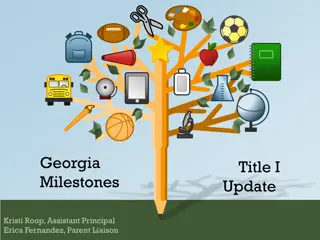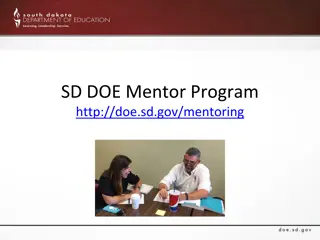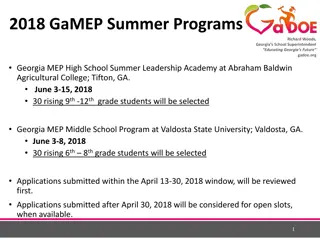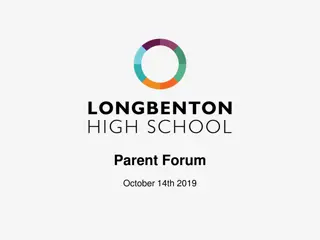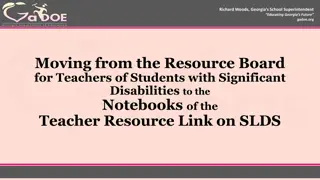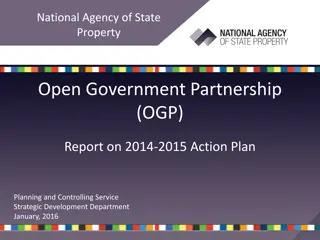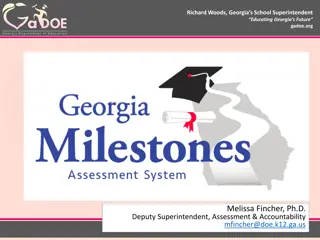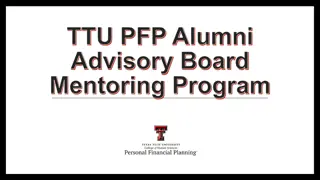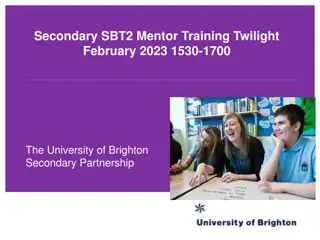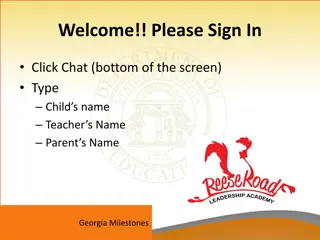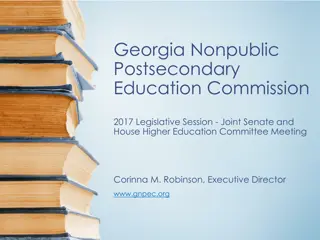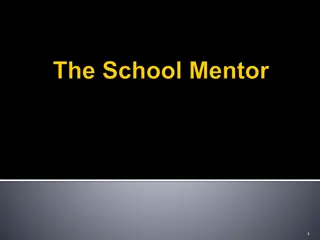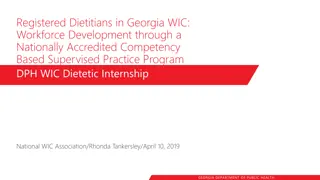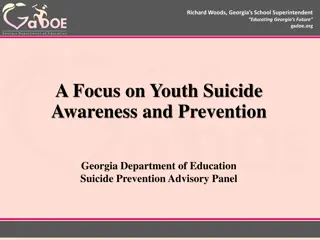Georgia Parent Mentor Partnership Overview
Georgia Parent Mentor Partnership (GaPMP) led by the Georgia Department of Education focuses on building effective family, school, and community partnerships to enhance student achievement, especially for those with disabilities. The partnership, established in 2002, has empowered over 100 parent mentors to support families, schools, and students. Through collaborative efforts, GaPMP aims to bridge communication gaps, increase family engagement in education, and improve student outcomes.
Download Presentation

Please find below an Image/Link to download the presentation.
The content on the website is provided AS IS for your information and personal use only. It may not be sold, licensed, or shared on other websites without obtaining consent from the author.If you encounter any issues during the download, it is possible that the publisher has removed the file from their server.
You are allowed to download the files provided on this website for personal or commercial use, subject to the condition that they are used lawfully. All files are the property of their respective owners.
The content on the website is provided AS IS for your information and personal use only. It may not be sold, licensed, or shared on other websites without obtaining consent from the author.
E N D
Presentation Transcript
The Georgia Parent Mentor Partnership (GaPMP) Led by the Georgia Department of Education, (GaDOE) Division for Special Education Services and Supports Rookie Training Guide A Training Tool for New Parent Mentors & Administrators MISSION: To Build Effective Family, School, and Community Partnerships that Lead to Greater Achievement for All Students, Especially those with Disabilities. OBJECTIVE: To Impact Student Achievement through Family Engagement Strategies
Mission and Vision Mission Statement: school and community partnerships which lead to greater student achievement for all students, especially those with disabilities. Build effective family, Vision Statement: Parent mentors and special education administrators will lead the way in Georgia to bridge the gap between home, school and community partnerships.
Our Story The Georgia Parent Mentor Partnership (GaPMP) is celebrating nearly 20 years of working together to increase achievement for all students, especially those with disabilities. The Partnership, started in early 2002 by Phil Pickens, Special Education Director, Georgia Department of Education, (GaDOE), with Family Engagement Specialist Patti Solomon and a small group of parents and administrators, now boasts more than 100 parent mentors helping families raising children with learning, behavioral and/or physical challenges. Parent Mentors have charted more than one million contacts. Mentors listen to both parents and educators, and use their unique knowledge of both worlds to overcome obstacles in communication and build a bridge of communication between home and school that leads to more successful outcomes for students. The GaPMP is supported by the Division for Special Education Services and Supports (DSESS). The parent leaders, moms and dads of children with disabilities, are hired by local school districts, state schools and the Department of Juvenile Justice to work with families, school teams, teachers, and the community. The goal is to build a bridge of communication between home and school that leads to more successful outcomes for students. Parent Mentors partner with families to increase their engagement in education, address individual concerns and also to support initiatives designed to improve all children s achievement levels. Although the Partnership under the leadership of the DSESS hosts a statewide conference each fall, it is unique how the Parent Mentor agenda is locally driven, which allows each program to meet the needs of its unique area. The DSESS also coordinates regional meetings four times a year and typically offers an annual University Session specific to Parent Mentor s leadership training needs. Mentors do many things such as: build connections for families in the community; concentrate on the transition needs of middle and high school students as well as pre- kindergarten students; lead task forces; organize training sessions; collaborate with teachers; serve as leaders on community boards; stakeholder groups; collaborate with Title I Parent Involvement Coordinators; and create family engagement activities in schools.
Getting Started Anne Ladd, Family Engagement Specialist Office 404-657-7328 aladd@doe.k12.ga.us Sharon Jones, Family Engagement Specialist Office 404-844-8741 sjones@doe.k12.ga.us Other Names to Know: Richard Woods State Superintendent of Schools Zelphine Smith-Dixon Director, Division for Special Education Services and Supports Jamila Pollard Program Manager
Next Steps Send all your contact information (name, title, email address, mailing address, office phone number) to us by filling out the Rookie Contact Form. The form is located in the password protected site for mentor access called the Learning Curve. Go to parentmentors.org and click on the Learning Curve tab. User is partnership, password is mentor. Click on the Rookie Resources tab and scroll down to download the Rookie Contact Form then email it to info@parentmentors.org . This will provide us with information to post on your Find A Mentor page on the parentmentors.org website and on the GaPMP Listserve. Locate office space, set up the office, telephone, computer, email etc. Facilities vary widely based on factors such as the district size, tax base, location, demographics, etc. It is generally expected that there will be office space in the district for the Parent Mentor; it is helpful if it is near other staff who may be working with families. It is best if parents can call a private voicemail message box so parents may call you directly. Read the school district s Policies & Procedures Manual. Discuss the local district s policies and procedures for: attendance, work hours, personnel actions, phone and email use, dress codes, internet use, travel approval, reporting suspected child abuse, and expense reporting. Some of it may apply only to full time employees, but the information will still be useful. You now represent your school district and professional conduct is expected. Discuss professional protocols with your Special Education Director. For example, how are media contacts to be managed, who needs to approve emails, group texts, social media postings, letters, brochures, or other materials before they are distributed, who approves travel requests, how is time documented, the dress code, managing schedule changes, reporting deadlines, travel and expense reports, call-in procedures etc.
Mandatory Trainings Annual GaPMP Kick-Off Conference (virtual for 2020) Four Regional Meetings - scheduled throughout the school year, your Region Rep will inform you about when and where Parent Mentor School online training and webinars *Administrators have an open invitation to attend all mentor trainings and meetings. Directors are encouraged to attend the Orientation session or send another administrator with the mentor. Directors are strongly encouraged to attend the Annual GaPMP Kick-Off Conference. The more you know about what is expected and about mentors successes and challenges, the better you can support your mentor and the more your district will benefit from having a mentor.
Introducing Yourself Send in your completed Rookie Contact Form so you can be part of: GaPMP listserve if you are having difficulties with signing up for the listserve, contact aladd@doe.k12.ga.us and ask that you be added to our listserve, parentmentors_georgia@yahoogroups.com. The listserve is a professional communication tool. Parent to Parent of Georgia (GaP2P) leadership are also on our listserve to share information. We work very hard to collaborate with GaP2P,our state s Parent Information Training Center (PTI), funded by the US Department of Education under IDEA. GaPMP website www.parentmentors.org Send a professional photo and contact information to info@parentmentors.org to be added the Find A Mentor pages. You will also want to refer to the Learning Curve, the password protected section of the website, which offers mentors access to the forms, documents and other resources you will need to complete annual reporting requirements and, also find shared materials you can use for your work. You will receive a user name and temporary password to access the Learning Curve. This will allow you to keep track of your progress on learning modules! Link www.parentmentors.org, the official web site, to your school district s special education page. What kind of social media does your district use and what are the protocols for use of social media and virtual platforms? Work with the district to promote the parent mentor on the district s special education page, staff directories, and parent resource information sources
Being a Professional ALWAYS re-read texts, facebook posts, emails and other correspondence as though the family involved or your director are looking at it. Make sure you spell check and read for continuity and clarity. It s hard to take it back once it goes out there. Don t share confidential information!!! Unlike volunteers, Parent Mentors are trained professionals working with families in your district. Confidentiality and trust are key. You will also need to earn the trust of staff.
Elevator Speech Activity Your elevator speech should answer three questions: Who are you? What do you do? Where do you want to go, or what are you looking for? You need to know exactly what you want to achieve or no one can help you get there. Take a minute to jot down some bullet points to practice: (use the back if needed) My name is: I am the parent mentor for: ______________________________________ My job is to: _______________________________________________ __________________________________________ Read more: http://www.businessinsider.com/how-to-tell-your-story-in-30- seconds-2013-11#ixzz3jALoGJFa
Where We Live and Work The GaPMP consists of six regions served by a regional representative who will help mentors with mandatory accountability reporting and quarterly contacts The Region Reps are: Northeast Bonnie Morris, Walton County Northwest - Michal Jones, Walker County Metro Antoinette Nichols, Cobb County Middle Jennifer Minter, State Schools Southeast - Amanda Locke, Evans County Southwest- Rebecca Best, Grady County
Helpful Hints Find your own mentor within your department, someone who can introduce you to key people in the district. If possible, work with the director and this local mentor to make a plan for introductions. Focus on building the important relationships and partnerships, beginning with everyone in your department and moving out into the schools, the district, and the community. Confidentiality safeguards are important to remember. As an employee, you may not talk about any students with disabilities with anyone unless that person also works with that student. This includes others within the school district, family or friends. It s easy to get excited about your work and accidently share confidential information. Be careful!! Boundary setting is critical. As a professional and a school district employee, you must also stay within the boundaries of your job. You can give advice and suggestions as a parent to other parents, but you are not a counselor, teacher, lawyer, or psychologist. You have an important role as a parent who mentors other parents, but it is important to honor the boundaries and not stray into another s role. Reporting possible or suspected child abuse: Find out what your school district s procedures are for reporting suspected child abuse. By state law you are a mandated reporter: http://oca.georgia.gov/mandated-reporter Respect co-workers by ensuring that you: Are prepared for meetings with talking points and questions Arrive on time for meetings and be sure your meetings begin and end on time Wear district name tag/carry business cards with you Dress appropriately Communicate in an open and responsive manner Respect different perspectives and learn from them Honor each other s expertise and experience Safeguard confidentiality Maintain accountability at the local and state level
Taking On Your New Role Special Education Family Handbook/Manual Most districts offer a special education manual to families as a valuable resource. This may be on the district website. You should print or obtain a hard copy and keep it for reference. It explains how the Individuals with Disabilities Education Act (IDEA) and the State Board of Education Rules for special education are followed in your school district. It provides the foundation for interactions between the school district and families, as their child is evaluated, eligibility for special education services is considered, the Individualized Education Program is developed, and the IEP is reviewed each year. It also outlines how to handle disagreements between parents and the school district. As a Rookie Parent Mentor, you should be very familiar with everything in this handbook/manual. GaDOE Website If your district does not have an existing handbook, then you may want to go to the GaDOE website to obtain generic information. Go to www.gadoe.org Hint: The GaPMP website offers access to information about your region on the Learning Curve.
Taking On Your New Role Georgia Student Success Improvement Plan SSIP also known as Indicator 17 - The Office of Special Education Programs (OSEP) has required that each State Educational Agency (SEA) develop a State Systemic Improvement Plan that includes a comprehensive, multi-year focus on improving results for Students with Disabilities. Each state must develop a plan that will outline the development of strategies to increase state capacity to structure and lead meaningful change in Local Educational Agencies (LEAs). While the primary focus of the plan is on improvement for Students with Disabilities, the State must also address in its SSIP how the State will use its general supervision systems to improve implementation of the requirements of Individuals with Disabilities Education Act (IDEA). Georgia will implement a systemic plan, Student Success, in FY16 to improve graduation outcomes for Students with Disabilities. Learn more: https://www.gadoe.org/Curriculum-Instruction-and-Assessment/Special-Education-Services/Pages/SSIP-.aspx Links to this webpage are also on the GaPMP website s Learning Curve.
Where Do You Fit In? This graphic shows all the considerations for educating students. Your role may move on this wheel, but it is important to see how Family Engagement and your work fits in. Sustainable change depends on having people with the problem internalize the change.
Taking On Your New Role The Implementation Manual explains the state special education rules in parent friendly terms and also provides school districts guidance in how to implement them. Most districts also provide a handbook for teachers that could provide useful information on how teachers are expected to implement special education rules. The GaDOE website also includes a wealth of information about education in general and about special education, including eligibility, services, IEPs, assessment, Parents Rights, discipline, rules, resources, training etc. Make sure you know how to find the Parents Rights (on the Special Education page. Here you ll find descriptions of Parents Rights under the Individuals with Disabilities Education Act (IDEA) in seven different languages, as well as videos in English and Spanish explaining the rights. Consolidated Application/ Local Improvement Plan (CLIP) Your school district also has an annual plan called the Consolidated Application that includes a special education plan for meeting these statewide Performance Goals and Indicators. You ll want to review it also. Most, if not all, of your activities should relate directly to helping the school district meet the parent involvement Goal and at least one of the other statewide Goals. A key part of the role of the Parent Mentor is to assist the school district in engaging parents in their student s education, providing information and resources that will enable them to make informed decisions.
Taking On Your New Role The Parent Survey The Georgia Department of Education distributes an online Parent Survey annually to parents in order to raise success rates for students with disabilities. The GaDOE asks parents to answer the survey to help assist local schools find ways find ways to better partner with families. All Parent Mentors are asked to assist with informing parents about the surveys and facilitating the return of as many surveys as possible. Parent Mentors view collecting such input as part of their Family Engagement process. Surveys are available in English and Spanish. Hint: Tips on how to assist your district with survey collection and survey data are on the GaPMP website Learning Curve. IEP Attendance Data All school districts maintain records each year on the percentage of parents of students with disabilities who attend their child s IEP meeting. As a Parent Mentor, you can help ensure parents attend the meetings by providing information and training on the parents role in the IEP meeting and how to prepare to contribute at the IEP meeting. The district will report data each year on the percentage of parents of students with disabilities who attend the IEP meeting. The PTA Family Engagement Standards The PTA Standards are a list the six types of involvement for successful partnerships with families. There are standards for welcoming, communicating, supporting all students speaking up for each child, sharing power, and collaborating with the community; they should be the bedrock upon which you build all of your family engagement initiatives and activities.
A First Month To-Do List 1. 2. Introductions at Central Office Staff meetings and Coordinator, Lead Teacher meetings. Find opportunities to tell your individual story to central office staff so colleagues can understand the challenges a parent faces and feels raising a child with a disability. Your local special education director can send information about you to school administrators, counselors, teachers, therapists, psychologists, school district partners, etc., describing your role and providing your contact information. Request technical training on platforms the district uses and become familiar with district policy. After discussing with supervisor, create online presence on district website, and social media. Does your district want you to do virtual meetings and trainings, webinars etc? Plan contents and frequency and then make sure you have approvals. Invite supervisor to the first few so they can get comfortable with you and offer feedback. Ask your supervisor about creating a data base so you can share information with families, via mass emails and texts and through platforms like REMIND With your Director s approval, create some printed material to market your program (Check the Parent Mentor Learning Curve online for samples of existing introductory brochures). 3. 4. 5. 6. 7. 8.
More Things You Can Do 1. Ask your supervisor to include you in district team meetings so you can meet with principals, counselors, and social workers in each school. Plan visits based on your district s goals and priorities. Join social media groups relating to families who receive sped services, attend family and community meetings and listen. Make sure you introduce yourself at the meetings. Meet with individual school PTA/PTOs. Determine if ALL parents are being included and how you can help. Contact the partners on your community map. Call the GAP2P representative for your area and introduce yourself. Build relationships and partnerships with leaders to work towards including ALL parents in their activities especially Title I and English Language Learners programs. Provide information about the Parent Mentor program to local newspapers, with prior approval from your Director and district Media Coordinator/Public Relations Director. Learn the approval protocol for any flyer, news item etc. and never distribute any information without first obtaining approval according to the local policy. Also find out what to do if a member of the media contacts you directly. Often you will need to refer the call to the Media Coordinator/Public Relations Director before responding to any requests for information or interviews. Send an approved introduction letter to every family with a student who has an IEP and one to every teacher. Decide with your director what services you are able to provide the first six months. Don t promise services you are not yet ready to provide. Distribute your contact information to intake staff, social workers, psychologists, counselors and diagnosticians to be given to parents at the time of referral or evaluation. 2. 3. 4. 5. 6. 7. 8.
Taking On Your New Role The Individuals with Disabilities Education Improvement Act of 2004 focuses on the need for families of children with disabilities to partner with educators to create better outcomes for students. In order to support the important role of families in the educational process, staff from the Divisions for Special Education and from other divisions such as Title 1 partner with individuals from state and private agencies to support families on a daily basis. In addition, the Divisions partner with parents through the State Advisory Panel for Special Education, the Georgia Parent Mentor Partnership, and school districts' special education stakeholder groups. The Divisions also collaborate on leadership training and communication resources with the state's major parent/family education and advocacy groups. A family engagement specialist on staff advises the Divisions on ways to increase parent engagement and build partnerships between educators and parents ultimately leading to better student outcomes. It is the goal of Georgia's parent initiatives to create a collaborative community of parents and educators to increase student achievement for students with disabilities. Part of the work includes collaborating with members of the Parent Leadership Coalition, which includes family engagement partners within the GaDOE, particularly Title 1 Parent Involvement Coordinators, and other state agencies and organizations. Partnerships Inside the School District After School Tutoring programs Career -Technical and Agriculture Education (CTAE) Communities In Schools connecting community resources with schools English to Speakers of Other Languages (ESOL) program High school Graduation Coaches (limited) Media Specialists PTA/PTO Parent - Teacher Resource Centers (Often funded by Title I) School Improvement Title I Parent Involvement Program Title I Parent Involvement Unit offers excellent resources to Parent Mentors and also extends invitations to its regional meetings. Partnerships with Other Agencies within the Community Parent to Parent of Georgia (GaP2P) Georgia s federally funded Parent Information and Training Center. This is a key partner and a great source of information for parents. Please spend some time on their excellent website to familiarize yourself with GaP2P and the services and resources available. Most important to begin is to travel on their Road Map to Services and Supports. Parent Leadership Coalition Agencies: Sharing information and resources to create better outcomes for children Bright from the Start - Georgia Department of Early Care and Learning, Childcare Inclusion and Pre-K Coordinators Children with Special Needs, Babies Can't Wait, Project SCEIs, Parent Educators, Georgia Department of Education, Division for Special Education Services and Supports and Title I Parent Outreach Georgia Council on Developmental Disabilities (GCDD) Georgia Department or Behavioral Health & Developmental Disabilities (DBHDD) Georgia Family Connection Partnership Institute on Human Development and Disability (IHDD) Leadership Institute on Developmental Disabilities, Georgia State University State PTA State Parent Information Resource Center (PIRC)
Parent Mentor Accountability There are several statewide expectations for all Parent Mentors. The Georgia Parent Mentor Partnership (GaPMP) is accountable for meeting statewide expectations because the Partnership is partially funded through the GaDOE. Parent Mentors participate in a variety of activities and collaborative efforts in their districts and communities, but they have common statewide requirements; such as but not limited to: planning, implementing, and reporting the results of family engagement work; attending state and regional meetings; & maintaining and reporting data through the year. Overview: Parent Mentors work to engage all partners during family engagement initiatives, pursuing positive outcomes for students and their families, while reaching system related objectives. Parent Mentors and their administrative supervisor work together to plan for the upcoming year, using provided GaPMP implementation tools and resources. Each Parent Mentor will select a goal with accompanying vital behaviors and participate in evidence-based family engagement work that improves results for students with disabilities. Each school district and their Parent Mentor are accountable for: 1. Identifying a Target Group and determining how progress data will be collected. You will want to review these with your director. It is best to start with a small number of parents (10 is good) and then determine a vital behavior that you will be training on and working with your parents to track progress. You do not have to invent Vital Behaviors. They are identified on the Evidence to Practice Guides on the Learning Curve. (You will see this on the next slide.) 2. FY Pre and Post Surveys- Reporting survey results via Google Docs. These are accessed on the Learning Curve as well. 3. Quarterly Contact Tracking Parent Mentors report their collaborative contacts related to family, school, and community engagement work each quarter. These are due on Oct. 15, Jan. 15, April 15 and May 30 or before you leave for the summer. 4. Progress Reporting - Parent Mentors report using Google Docs links on the Learning Curve. This information is about your progress on Learning Targets, Vital Behaviors and trainings with parents. These are due on Oct. 15, Jan. 15, and April 15. All of these forms are available on the website in the Learning Curve under the Reporting tab.
Collaboration and Tools Parent Mentors have several opportunities to collaborate with one another during the school year. Parent Mentors are required to attend professional development opportunities once a quarter in their regions and once a year at the GaPMP Kickoff Conference in the fall. Other opportunities to collaborate together may include online learning opportunities, webinars, and/or other system or state related conferences you may attend as part of your local school system. Regional Reps and the Listserve are ongoing resources available to assist in your successful family engagement related work and reporting. GaPMP Family Engagement Toolkit 1. Family Engagement Checklist Parent Mentors can use this checklist to make sure they are completing family engagement activities and trainings. 2.Evidence to Practice Guides Parent Mentors will use these guides to utilize family and community engagement research related to Parent Mentor initiatives. 2. Data Reporting Tool Shortened version of reporting form to record Parent Mentor related work. 3. Pre and Post Surveys Data collection tool for target group, administered prior to targeted activities and at the end of year, to assist in identifying impact of family engagement work during FY__. 4. Annual Statewide Parent Survey Data collection tool for end of the year evaluation of your target group. Will assist in validating the family engagement work during FY__.
Online and Ongoing Support Connect with seasoned mentors to help you. Attend regional meetings and trainings for professional development and reporting support. All tools mentors need for fulfilling their contract requirements can be found on the Learning Curve under the Reporting tab.
Parent Concerns General Hints Listening and communication skills. Collect all available background information The student's file may be reviewed, with prior parent permission or as per School District protocol, if you are working with the family/student. You do not have access to all IEPs, only those of students/families with whom you are directly working. If required, with guidance from the Director or supervisor, you can act as a liaison to assist in resolving the concern or dispute. Ensure that the parent/guardian has a copy of the GaDOE Dispute Resolution Sheet. This can be found on the GaDOE website and in many counties is included in the Parent Welcome Packet when a child enters into the Program for Exceptional Children. NOTE: Discuss these steps with your Director/supervisor before proceeding. There is specific updated information available on the DOE website, regarding dispute resolution. Please check this out. You can also direct the parent to information on the site. Informal Resolution/Local 1.) Suggest that the parent talk with the child s teacher(s). If necessary, request an IEP team meeting to discuss concerns. At the meeting focus on the issue at hand. Keep the discussion ALL about the student and his or her educational needs. Remember that everyone is on the same team, working to ensure an appropriate education for the student. 2.) If the concern is still unresolved, discuss it with lead special education teacher 3.) If the concern remains unresolved, discuss it with the principal 4.) If it is still unresolved, discuss the concern with the special education director or his/her designee. 5.) Finally, if the concern hasn t been resolved yet, discuss it with the superintendent. Remember that professional protocols may exist in the district for making appointments ahead of time to see the teacher, lead teacher, principal, director, or superintendent. Find out what these are and be sure to keep your immediate supervisor informed at each step along the way, especially if contacting the principal or superintendent.
Reporting All online reports can be accessed on the reporting tab of the Learning Curve FY21 Family Engagement Alternate Assessment Quarterly Contacts Pre and Post Survey
Parent Concerns Formal Resolution/GaDOE If the issues are still unresolved after every effort to correct the problem locally, parents may elect to use the formal IDEA dispute resolution options. It is always recommended to first try to resolve the problem with the teacher, school or school district, so encourage parents to try to resolve the issues locally before turning to these formal options. The three formal dispute resolution options are: Filing a Formal Complaint Requesting Mediation Requesting a Due Process Hearing The procedure to follow for each of these options can be found on the GaDOE website. Go to http://www.doe.k12.ga.us. Click on Home on the upper left > Curriculum and Assessment > Special Education Services and Supports. Scroll down to Dispute Resolution and click on the desired option. The parent should follow the directions as indicated for the option they wish to pursue. Be sure to notify your immediate supervisor and the special education director if a parent intends to file a complaint or request mediation or a due process hearing. It is important to follow up with the parent/district to check on the outcome. It may help to direct parents to agencies and proactive support groups and resources to support their ongoing needs. Don t forget the parent-friendly explanation forms on major special education issues and regulations on the GaDOE website.
Participation & Leadership Leadership Council The Georgia Parent Mentor Partnership Leadership Council membership is made up of seasoned mentors who understand the mission and vision of the GaPMP and wish to help strengthen and improve this initiative. Leadership Council Executive Board Chairperson Missy Sullivan, Carrollton City Schools Chairperson Elect Karen Tharpe, Appling County Schools Advisors Alecia Segursky, Gordon Charity Roberts, Coastal GLRS Loranda Holmes, Marion
Congratulations! Notes and Questions






